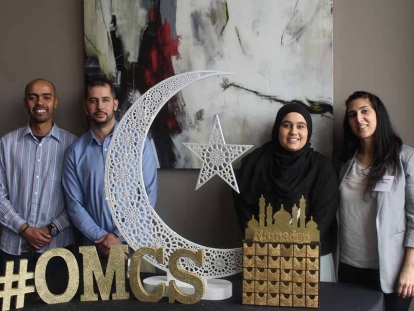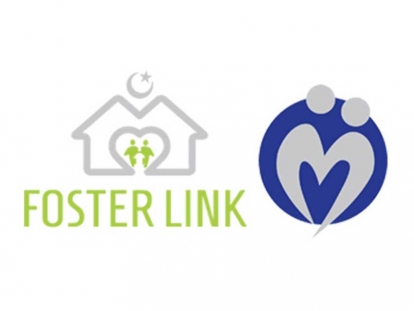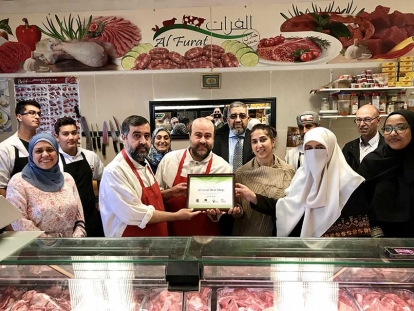Oct
Oct
Shared Journey: Building Bridges between Ottawa's Muslims and the Children's Aid Society
Written by Chelby DaigleMuslim Family Services of Ottawa (MFSO) is working with the Children's Aid Society of Ottawa (CAS) to implement the Shared Journeys project which aims to improve communication and collaboration between CAS and Ottawa's Muslim communities.
The impetus for the project arises from the work of the Muslim Resource Centre for Social Support and Integration (MRCSSI) of London, Ontario which has worked with that city's CAS to dramatically reduce the number of Muslim children who are taken into care. MRCSSI received $285,000 from the Ontario Trillium Foundation and another $70,000 from the Ontario Ministry of the Attorney General in order to expand the project to York, Kingston, and Ottawa.
CAS is an institution which is often perceived quite negatively by Muslim and mainstream communities alike. On June 16th at a community engagement event organized to raise awareness about the project, Barbara MacKinnon, the Executive Director of CAS in Ottawa, tried to clarify CAS's role.
“We want to prevent children coming into our care so that's why 90% of our work is wrapped around the family, ensuring that families have the supports that they would benefit from. Children need to understand that calling CAS is about helping them get the supports to strengthen their family,” Ms. McKinnon explained. Creating opportunities for Muslim communities to learn more about CAS's role and the services it provides is one aspect of the Shared Journeys project. Another more challenging aspect of the project is supporting Muslim children who are taken into care.
But the Shared Journey project is not starting from scratch in this regard. Over the last few years, the tireless efforts of a team of dedicated volunteers, who have come to call themselves CAS Friends, have built bridges between CAS and Ottawa's Muslim communities. Aaminah Ega, a member of CAS Friends, credits Majeda Elghaben with founding the team.
“We saw the need to support Muslim children who have been taken away from their homes, for whatever reason, and put into non-Muslim foster homes. There was a lot of trauma for these children. They were put into a home where they have no relation to the culture.” Ms. Ega gave the example of Muslim children who come from cultures where dogs are viewed negatively being put into homes where dogs are pets.
“These children have been told ”˜Make sure you stay away from dogs.' and then they are put in a foster home where there is a dog so now the kid is on edge,” Ms. Ega explained. CAS Friends began working with CAS to help them become more culturally sensitive to the needs of Muslim children in care.
CAS Friends has worked with CAS to help identify relatives whom Muslim children could stay with (kinship homes) or Muslim foster parents who are equipped to take in the children. Ms. Ega says now CAS calls CAS Friends when they have situations involving Muslim families, including very difficult ones. “Sometimes, I find myself at 1 o'clock in the morning trying to find solutions. Sometimes we are meeting at Tim Horton's at Walkley or at Masjid Assalam or we are skyping each other so that we can come up with a solution for a particular problem,” explained Ms. Ega. But this is the work CAS Friends see as their duty as Muslims in order to support the most vulnerable members of the community.
Fouad Khan, Executive Director of MFSO, said he hopes that funding for a paid staff person to support CAS Friends' volunteer efforts will lead to an increase in the identification of kinship homes as well as the number of Muslims applying to be foster parents. Mr. Khan also hopes the project can help to prevent Muslim children from having to be put into care in the first place.
“We are trying to identify signs that families might be having issues that could result in their children being taken into care. If we can identify the warning signs and get them support we can inshallah prevent the children from possibly going into care,” Mr. Khan explained.
One of those warning signs is spousal abuse. Shawana Shah, who has a Masters in Counselling from the University of Ottawa, has been hired to work part-time to help implement the Shared Journey model in Ottawa as MFSO's CAS Community Liaison Officer. Ms. Shah has experience working with Ottawa's Muslim community on sensitive issues. In the past, she coordinated the Immigrant Women's Services of Ottawa's provincially funded Neighbours, Friends, and Families project which raised awareness about domestic violence in Ottawa's Muslim communities. Ms. Shah said she realizes the in order to address the possible risk factors that may lead to children being taken into care, there is a need to speak openly and frankly about the reality of domestic violence, but this is a challenge that her past experience on the Neighbours, Friends, and Families project has well equipped her for.
To learn more about the Shared Journeys project in Ottawa contact This email address is being protected from spambots. You need JavaScript enabled to view it.
This article was produced exclusively for Muslim Link and should not be copied without prior permission from the site. For permission, please write to info@muslimlink.ca.

Chelby Daigle
Chelby Marie Daigle is Muslim Link’s Editor in Chief and Coordinator. Under her direction, Muslim Link adopted its Diversity, Equity, and Inclusion Policy so that the website strives to reflect the complexity of Muslim communities in Canada. She knows that she fails to do justice to this complexity every day but she will continue to try to improve as she recognizes the frustration of being both marginalized in the mainstream and also marginalized in Muslim communities. As Coordinator, she works to build relationships with Muslim and mainstream organizations and manages the website's social media, event listings, and directories. She organizes regular Muslim Link gatherings. She also works closely with the Publisher to find ways to keep Muslim Link sustainable. Find her on Twitter @ChelbyDaigle















